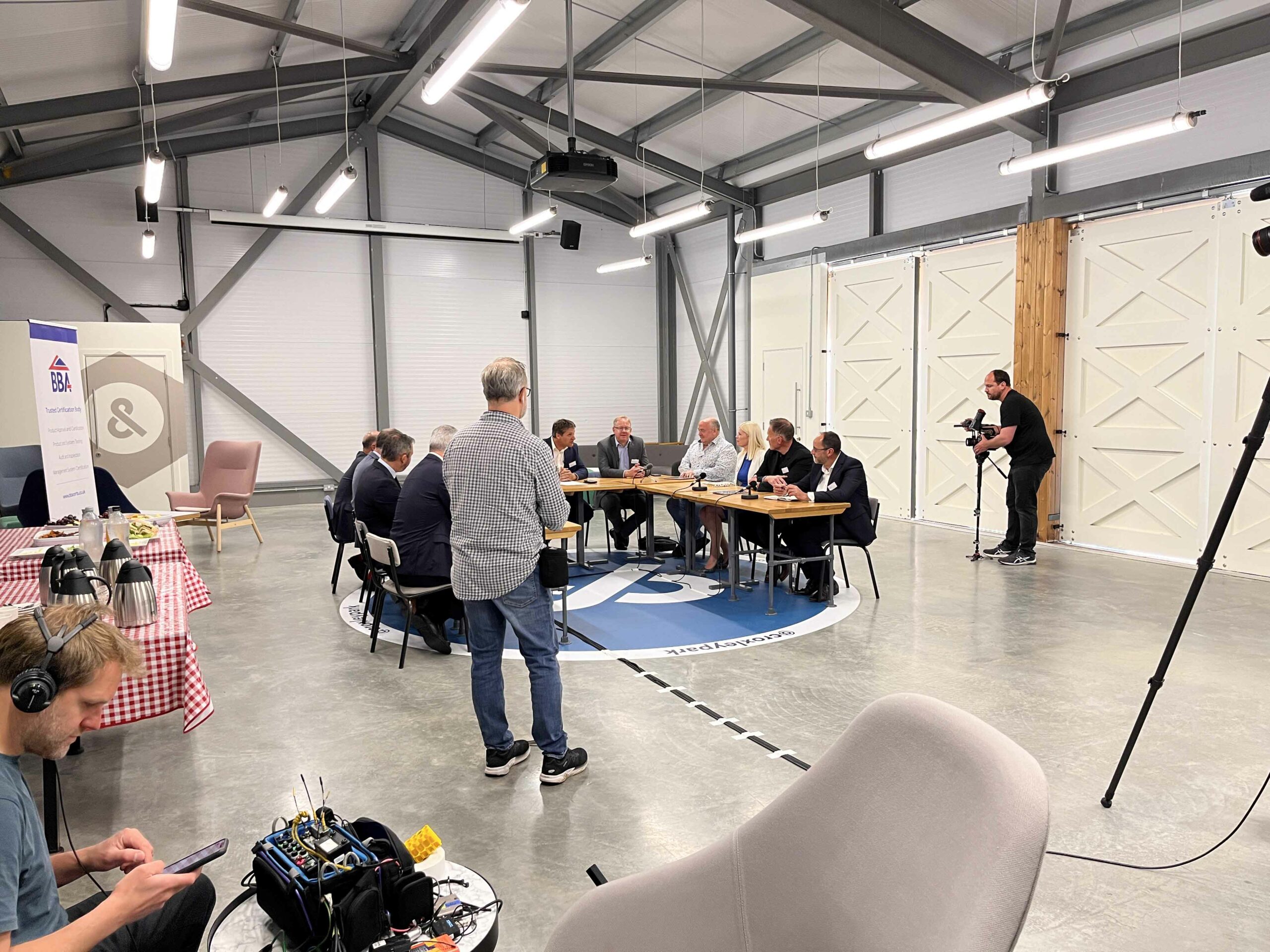Are we doing enough to encourage and engage with the next generation of construction industry workers?
Are we doing enough to encourage and engage with the next generation of construction industry workers?
Speaking at the BBA’s Round Table discussion, Hardy Giesler BBA Chief Executive Officer, Richard Waterhouse BBA Non-Executive Director, Craig Smith Industry Lead / Convenor of City & Guilds, Jason Cureton Founder of Insulfix Ltd, David Johnson Technical Director of DGuage Ltd, Colin Johnson Managing Director of DGuage Ltd, Richard Smith Head of Products & Innovation of NHBC, Adam Turk Chief Executive Officer of Siderise Group Ltd, Antony Brophy Director of Business Development UK at CoBuilder and Emma Wiles BBA Sales & Marketing Director, shared their views.
Watch part 4 of 5: BBA Roundtable – Is Construction next-gen ready?
Adam Turk: Siderise Group
“When the army wants to recruit, they do some great ads on TV showing how you can be all over the world and doing wonderful things. I think the construction industry needs to do something similar; we need to take that message to the wide audience and tell people how great the construction industry is. We need to stop allowing government to beat our industry up and instead should be picking up on the great things our industry does and put that forward. I think we need to be doing more work in schools and in colleges, talking to people about the types of employment that is there for them in construction.”

Jason Cureton: Insulfix
“To me I would even take it one step further. I recently took my youngest to his next school. We walked around the school; but where was the practical element of their learning? There was not one example. How will the younger generation know that if they’re not academic, there is an avenue for them to move into a good career in construction, if they don’t know or not aware of practical, hands-on stuff. It’s great that education is computerised and tech-ready, but that is not going to happen unless you have people at the other end that will be implementing that. I feel that we need to be getting into the schools before they start selecting their options. I don’t understand why brick manufacturers, plastering manufacturers etc, don’t realise that if we don’t have the youngsters coming into the business in 10 – 15 years time, they won’t have a business. Manufacturers need to start stepping up to the plate and taking an active role in schools and showing the less-academic students to show that there is valid opportunity for them to contribute. We need to reach them at an early age.”

Craig Smith: City & Guilds
“I think to encourage younger people into the industry is critical; its clearly a problem now. There are fewer people coming into the space and choosing apprenticeships and college routes generally. I think its for us to come together and start young; there’s work to be done in schools. I think we also need to be getting the message out where the young people are. When I’ve worked in other businesses and talked about channels to broadcast key messages, we need to be where they are. It’s not about hard-sell careers messaging, but rather selling the good news stories, the purpose of the sector through channels that they will relate to, from people who are living and breathing it.
I think the young people nowadays are purpose-driven; there are messages around security that are important, and career longevity, but I think we need to answer the question Why. Why does it exist, what is it doing to improve people’s lives and living condition? Those are the things that will resonate.”

Hardy Giesler: BBA
“It’s clear that we’re not doing enough. Statistics show that there is a shortage of skilled and unskilled labour in the UK construction industry. We know that other simple measures we’re not building enough houses, and we’ve not hit our target for a number of decades. We know that the average age in the industry is increasing. These are all things that are creeping up on us and won’t be going away. We need to something about that very soon. coming back to Adam’s point, if we introduce what the industry has to represent, that’s a big step in the right direction. There are people in their late 20s who are plumbers and electricians who earn £80k per year – not many other professions that offer that. I would also suggest that the quality of life associated with that profession is also pretty good. Taking Jason’s point, I think people are just not exposed to these opportunities that construction offers.”

Emma Wiles: BBA
“I think its about the reputation and pride in the industry. Its taking those valuable skills and showing what the outcomes are; talking about safety – there are a lot of people that work in construction that are responsible for safe environments for people to live and work. Design, there is cutting-edge design where a lot of people play a part of to get to an end result, but a lot of that is hidden. If you talk about going to college, one speaks about brick-laying; they’re not talking about building something that has a valuable contribution to a community, or changes the way people live, or adapts someone’s affordability in how they live in a house. Reputation is really important that will make people want to be part of something bigger in an industry that has such breadth and touches on every part of the community.”

Antony Brophy: CoBuilder
“I don’t think we’re doing enough to engage and attract people to our industry. What we don’t do well is share personal stories. If I was at school now, I’d want to understand how you got to where you are now. something that I could reflect on, and relate to. My personal story – I went to school, I wasn’t an academic. I had to choose what I wanted to do. I was always interested in drawing stuff and making stuff. I was always in my Grandad’s shed nailing bits of wood together and I ended up doing that at university. From there, people need to understand that you don’t need to make decisions at certain points in your life. We don’t tell people that there are transferrable skills in this space, and are more important than most things. You don’t need to decide, at the age of 10 or 11, that you’re going to move into construction.”

Richard Smith: NHBC
“Twenty years ago, we’d call a brick-layer a craftsman, and a carpenter a craftsman. Now, what we tend to have is a high number of subcontractors that move around with not a high amount of security. If you’re a trainee bricklayer or carpenter, how do you become a trainee and earn that security to get onto the career and buy your first property. I think there’s a lot to be done here. In my view, we should be focussing on the skills and trades as being crafts to be proud of. I also think that there are a number of here who started in trade that moved into the professional environment, having that pragmaticism of how to build has helped to make us better as a professional. I think that encouraging people to learn a trade, gives you an opportunity to do a lot more in your career. I think we need to look at how we make the apprenticeship role more stable as an employment route.”

Share This Story, Choose Your Platform!
Related Roundtables
Are we doing enough to encourage and engage with the next generation of construction industry workers?
Are we doing enough to encourage and engage with the next generation of construction industry workers?
Speaking at the BBA’s Round Table discussion, Hardy Giesler BBA Chief Executive Officer, Richard Waterhouse BBA Non-Executive Director, Craig Smith Industry Lead / Convenor of City & Guilds, Jason Cureton Founder of Insulfix Ltd, David Johnson Technical Director of DGuage Ltd, Colin Johnson Managing Director of DGuage Ltd, Richard Smith Head of Products & Innovation of NHBC, Adam Turk Chief Executive Officer of Siderise Group Ltd, Antony Brophy Director of Business Development UK at CoBuilder and Emma Wiles BBA Sales & Marketing Director, shared their views.
Watch part 4 of 5: BBA Roundtable – Is Construction next-gen ready?
Adam Turk: Siderise Group
“When the army wants to recruit, they do some great ads on TV showing how you can be all over the world and doing wonderful things. I think the construction industry needs to do something similar; we need to take that message to the wide audience and tell people how great the construction industry is. We need to stop allowing government to beat our industry up and instead should be picking up on the great things our industry does and put that forward. I think we need to be doing more work in schools and in colleges, talking to people about the types of employment that is there for them in construction.”

Jason Cureton: Insulfix
“To me I would even take it one step further. I recently took my youngest to his next school. We walked around the school; but where was the practical element of their learning? There was not one example. How will the younger generation know that if they’re not academic, there is an avenue for them to move into a good career in construction, if they don’t know or not aware of practical, hands-on stuff. It’s great that education is computerised and tech-ready, but that is not going to happen unless you have people at the other end that will be implementing that. I feel that we need to be getting into the schools before they start selecting their options. I don’t understand why brick manufacturers, plastering manufacturers etc, don’t realise that if we don’t have the youngsters coming into the business in 10 – 15 years time, they won’t have a business. Manufacturers need to start stepping up to the plate and taking an active role in schools and showing the less-academic students to show that there is valid opportunity for them to contribute. We need to reach them at an early age.”

Craig Smith: City & Guilds
“I think to encourage younger people into the industry is critical; its clearly a problem now. There are fewer people coming into the space and choosing apprenticeships and college routes generally. I think its for us to come together and start young; there’s work to be done in schools. I think we also need to be getting the message out where the young people are. When I’ve worked in other businesses and talked about channels to broadcast key messages, we need to be where they are. It’s not about hard-sell careers messaging, but rather selling the good news stories, the purpose of the sector through channels that they will relate to, from people who are living and breathing it.
I think the young people nowadays are purpose-driven; there are messages around security that are important, and career longevity, but I think we need to answer the question Why. Why does it exist, what is it doing to improve people’s lives and living condition? Those are the things that will resonate.”

Hardy Giesler: BBA
“It’s clear that we’re not doing enough. Statistics show that there is a shortage of skilled and unskilled labour in the UK construction industry. We know that other simple measures we’re not building enough houses, and we’ve not hit our target for a number of decades. We know that the average age in the industry is increasing. These are all things that are creeping up on us and won’t be going away. We need to something about that very soon. coming back to Adam’s point, if we introduce what the industry has to represent, that’s a big step in the right direction. There are people in their late 20s who are plumbers and electricians who earn £80k per year – not many other professions that offer that. I would also suggest that the quality of life associated with that profession is also pretty good. Taking Jason’s point, I think people are just not exposed to these opportunities that construction offers.”

Emma Wiles: BBA
“I think its about the reputation and pride in the industry. Its taking those valuable skills and showing what the outcomes are; talking about safety – there are a lot of people that work in construction that are responsible for safe environments for people to live and work. Design, there is cutting-edge design where a lot of people play a part of to get to an end result, but a lot of that is hidden. If you talk about going to college, one speaks about brick-laying; they’re not talking about building something that has a valuable contribution to a community, or changes the way people live, or adapts someone’s affordability in how they live in a house. Reputation is really important that will make people want to be part of something bigger in an industry that has such breadth and touches on every part of the community.”

Antony Brophy: CoBuilder
“I don’t think we’re doing enough to engage and attract people to our industry. What we don’t do well is share personal stories. If I was at school now, I’d want to understand how you got to where you are now. something that I could reflect on, and relate to. My personal story – I went to school, I wasn’t an academic. I had to choose what I wanted to do. I was always interested in drawing stuff and making stuff. I was always in my Grandad’s shed nailing bits of wood together and I ended up doing that at university. From there, people need to understand that you don’t need to make decisions at certain points in your life. We don’t tell people that there are transferrable skills in this space, and are more important than most things. You don’t need to decide, at the age of 10 or 11, that you’re going to move into construction.”

Richard Smith: NHBC
“Twenty years ago, we’d call a brick-layer a craftsman, and a carpenter a craftsman. Now, what we tend to have is a high number of subcontractors that move around with not a high amount of security. If you’re a trainee bricklayer or carpenter, how do you become a trainee and earn that security to get onto the career and buy your first property. I think there’s a lot to be done here. In my view, we should be focussing on the skills and trades as being crafts to be proud of. I also think that there are a number of here who started in trade that moved into the professional environment, having that pragmaticism of how to build has helped to make us better as a professional. I think that encouraging people to learn a trade, gives you an opportunity to do a lot more in your career. I think we need to look at how we make the apprenticeship role more stable as an employment route.”

Share This Story, Choose Your Platform!
Related Roundtables
Get in touch
Please complete the form below and we will contact you as soon as possible.
To help us to respond to your inquiry as quickly as possible, we have put a handy list of our services below.


